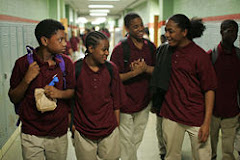During Summer Bridge, I am teaching the same lesson nine times over the course of the week. In past years, I've been terribly bored with this schedule; it just gets pretty tedious to say the same things over and over and over again to different groups of incoming 9th graders.
While I still might get bored this year, I find myself a little more accepting of the schedule so far. First of all, I'm really in need of a vacation and some down time after the month of intense Shakespeare study, so not having to plan a new lesson every night gives me some time for myself and my own endeavors (including cleaning my office, which is stacks and stacks of junk after the month of being too busy to do anything about it, plus finishing up syllabi and course maps). Secondly, at least for the first few times through the lesson, I'm intrigued by how it takes shape.
See, I'm basically giving a lesson on A Hope in the Unseen. But I start out with a round around the room, where I hear from the students their name, their middles school, and their favorite book they read in middle school. Sometimes I'll ask them other things, like if they've had relatives who went to the schoool or whether they've done their summer reading. Then, we take a "practice quiz" ovfer the book, something I tell them is a way to figure out if they're ready for August 25 (the first day of schol). It's 15 questions, multiple choice, and we score it together; I never see their scores and tell them to take it for what it's worth.
Then, invariably, I go on little spiels about certain topics:
Spiel #1: "Dreambusters" - in A Hope in the Unseen, Cedric talks about dreambusters, the people who say "You can't" or "You won't," and how he has to ignore them and do his own thing. I tell the students that everyone has their own version fo this, and it's important that we all find the strategies to resist, whether those "dreambuster" come in the form of hallway hangers or forces in our neighborhoods.
Spiel #2: Not taking the easy route - I tell the sutdents that it's easy to float by through high school, to get a grade of a 68 or a 71 average, and do fine by those standards, to "pass" and that's it. You'll get yoru diploma, I say, but not much else. I tell them to work hard, to accept nothing less than an 80 in any class, and take control of their education by ensuring this.
It seems like in every section, I come to these spiels in different ways - they'll be a response to a student's answer to a question, or in my closing remarks - and I'll vary the examples and the way I tell the stories. But, otherwise, they'll be pretty similar. And, even though they weren't part of my rudimentary plan for the lesson, they seem to be doing well with it. Most of them come up with the question, "Why would we have chosen this book for you as summer reading?". What I don't want to hear is that "Oh, we're poor, and we're black, and you all want us to be like Cedric." No. Not true. Cedric was by no means a perfect student; he had no balance in his life, could not adjust well socially, and often was haughty and unaccepting of others. But, we all can take things from Cedric's story and apply them to our own lives, whether it's the refusal to give up, the hard work, the faith, the goal-setting. And, for our students, I hope they see the transition from middle school to high school could have some similarities to Cedric's transition from high school to college.
All in all, a good day, with some great (and still quiet) new kids.
Resep Masakan
11 years ago

No comments:
Post a Comment